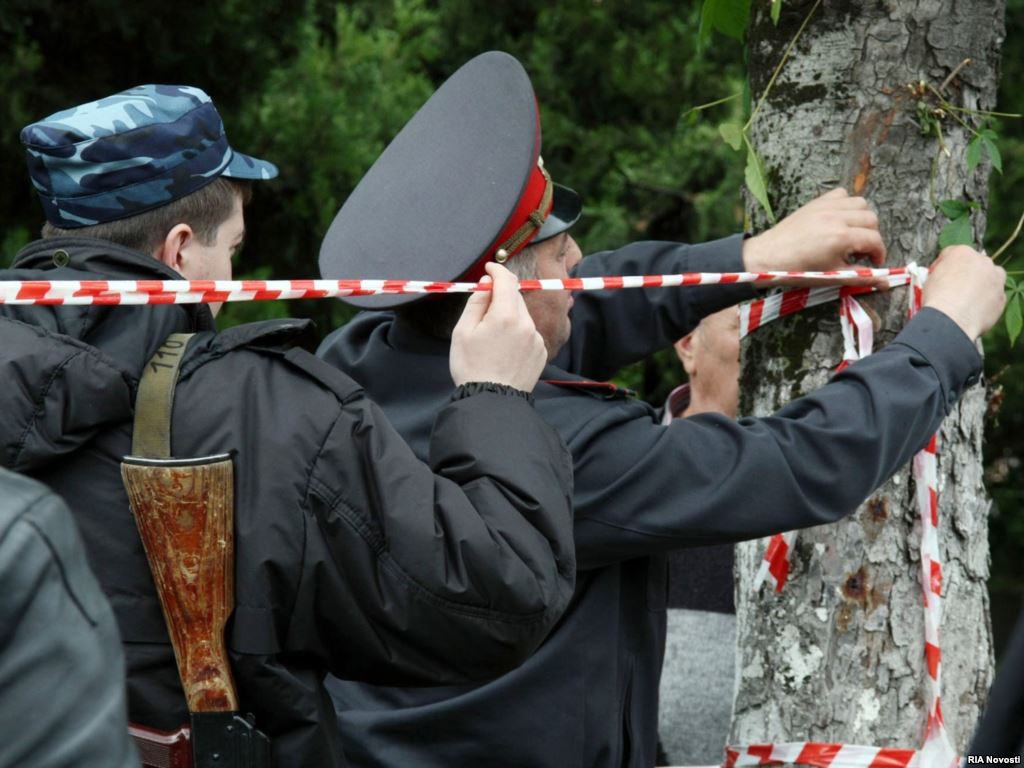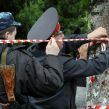
Fight Between Authorities and Islamist Militants Intensifies in Kabardino-Balkaria
Publication: Eurasia Daily Monitor Volume: 12 Issue: 76
By:

Against the backdrop of the simmering conflict in Kabardino-Balkaria, President Vladimir Putin replaced the interior minister of the republic, Sergei Vasiliev, with a police major-general, Igor Romashkin. Vasiliev had been in office since 2010. The new Kabardino-Balkarian interior minister served as deputy director of the Russian Ministry of Interior’s directorate in the North Caucasus Federal District (Kavkazsky Uzel, April 9). Since Vasiliev was not promoted after his dismissal, it likely means he was replaced because of his unsatisfactory performance in the republic.
On April 7, the security services sealed off a shop in the city of Baksan, Kabardino-Balkaria, known as a place where Islam-related items were sold, and detained a young Kabardinian woman who worked there. For several hours, the authorities denied her relatives and lawyers access to the detained woman (Islamdin.com, April 7). A Federal Security Service (FSB) unit from outside of the republic was deployed to capture the woman. Judging by the appearance of the servicemen, the unit came from Buryatia or Yakutia. Even for such a relatively trivial operation as arresting a young woman, Russia’s FSB does not rely on local servicemen.
According to the Russia media, on April 14, a 39-year-old man named Atmir Kerefov was killed in the suburb of Nalchik known as Domostroitel. The police found a gun with a silencer, ammunition, an RGD-5 hand grenade, a grenade launcher, several improvised explosive devices (IED) and IED components in the house where he reportedly sought shelter (Sk-news.ru, April 14). According to the FSB, the slain man manufactured homemade weaponry that he supplied to militants for carrying out terrorist attacks. The police did not report whether they suffered any casualties in the operation. The fact that the militants are trying to manufacture their own weapons means that they are likely having problems obtaining arms supplies.
Also on April 14, a suspected militant was arrested in the village of Stary Cherek. According to investigators, the 35-year-old man had voluntarily joined the illegal armed groups in 2012. The suspect reportedly regularly bought food, clothing and other items and supplied them to members of the illegal armed groups. The suspect also provided shelter to the insurgents and helped them move around (Kavkazsky Uzel, April 14). The maximum punishment for such activities is five to ten years in prison.
On April 16, the police found a weapons cache that included a hand grenade, a VOG-25 40-milimeter anti-personnel grenade, a machine gun cartridge and 30 other cartridges of various calibers in a forest near the village of Chegem. The website of Kabardino-Balkaria’s interior ministry reported that according to preliminary information, the weapons cache belonged to a 25-year-old local who was killed in a special operation last November, (07kbr.ru, April 16). It was unclear why a weapons cache belonging to a militant killed in the fall of 2014 was found only in the spring of 2015.
On the evening of April 15, the authorities introduced a counter-terrorism operation regime in the central part of Nalchik, in the area of Tlostanov Street, Lenin Boulevard, Karashaev Street and Kirov Street. The counter-terrorism operation regime was lifted the following morning. Members of the armed Islamic resistance movement had allegedly been discovered in an apartment building, after which the authorities evacuated residents of the apartment building and called on the surrounded militants to surrender, but the militants opened fire on the police and were killed by return fire. Those killed were identified as 27-year-old Prokopchuk Zaur Yurievich and 33-year-old Uyanaeva Tanzilya Husseinovna, who was probably his wife (Islamdin.com, April 16).
It is unlikely whether the woman killed in the operation was a member of the insurgency, since it is uncharacteristic for this jamaat. Moreover, the security services apparently expected to find someone quite different from these two people. Prior to identifying those killed, the government announced the killing of the leader of Kabardino-Balkaria’s insurgency, amir Salim (Zalim Shebzukhov). However, after the identification procedures were completed, it became clear that Shebzukhov was not one of those killed (Newsofimarat.wordpress.com, April 16).
In an apparent attempt to cover up their mistake, the authorities declared that the slain Zaur Prokopchuk was the amir of the so-called Central Sector of the Kabardino-Balkarian Velayat of the Caucasus Emirate (Regnum.ru, April 16), which is not exactly the truth. The slain militant was an ethnic Russian, which is not particularly surprising given that the Caucasus Emirate regularly recruits ethnic Russians who convert to Islam and wage war on the government.
Kabardino-Balkaria’s law enforcement officials also announced that they had disrupted a channel for recruiting female militants to fight in Syria after a female resident of Moscow was detained in Nalchik and told the police that she had planned to travel to the Middle East with her husband. The Moscow resident had found and married her husband using the Whatsapp smartphone instant messaging app (Kbrria.ru, April 9).
It seems that the average week in Kabardino-Balkaria is packed with events related to the activities of the armed resistance. The republic is becoming increasingly Islamicized and young people there are becoming increasingly radical, all as a result of the Russian authorities’ attitude toward those who do not fit into the Russian definition of Islam. This means that tensions related to the Islamic movement will continue to grow.




